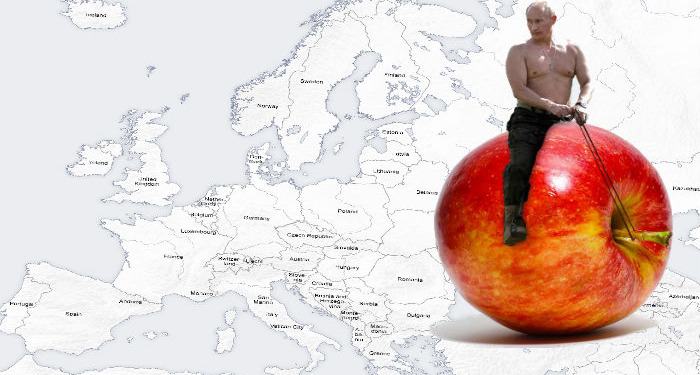As soon as the Ukraine war started, in February 2022, the West’s unanimous response was sanctions. They were supposed to destroy the Russian economy, but have they? Among the latest growth forecasts of the International Monetary Fund (IMF) for 2024, one is especially striking, its revised growth forecast for Russia: 2.6%, up from 1.1% last October.
The IMF’s revised outlook may come as a surprise since it is such a sudden departure from the forecast made only four months ago. But, the IMF says it is grounded in “a number of” factors, including the easing of sanctions, a rebound in domestic demand, and strong commodity prices.
However, the IMF also warns that the outlook is uncertain and could be affected by several other risks, including the continuation of the war in Ukraine, a further tightening of sanctions, and a slowdown in global growth.
The fact that Russia is doing better than expected probably played in the EU decision — just announced — to provide €50 billion in financial assistance to Ukraine over the next four years, intended not for war but to support Ukraine’s economic recovery, reconstruction, and reform efforts. This is commendable and will certainly as Ukraine President Zelensky immediately said, “strengthen long-term economic and financial stability, which is no less important than military assistance and sanctions pressure on Russia.”
One thing is certain: This European aid to Ukraine confirms European long-term political support to Ukraine, meaning that the war is not likely to end soon.
Especially if the Russian economy is not weakening — if one is to believe the IMF analysis, and there is little reason to disbelieve it.
How the business press reacted to this news is telling. For the Financial Times, the rise in growth outlook is caused by the war effort in Ukraine. Likewise, in Italy, Alberto Orioli, the Sole 24 vice-director who comments the daily news in his daily podcast “Il Punto,” asks pointedly:
“It is now reasonable to imagine that the sanctions did not hit as they should have. And maybe ask why.”
What is keeping the Russian economy afloat
First, it should be highlighted that, despite the upward revision in growth in the IMF’s forecast for Russia, it is still significantly lower than the average growth rate for emerging markets, which is expected to be 4.1% in 2024. This likely reflects the impact of the sanctions imposed on Russia in response to its invasion of Ukraine.
However, the IMF notes that Russia’s economy is more resilient than many had expected and that it has been able to adapt to the sanctions by diversifying its trading partners and developing new avenues for export.
Diversifying trade partners of course means that large trade avenues have been opened with China, India, and even distant Brazil. These countries — especially the first two — have maintained close economic ties with Russia, as they probably see an opportunity to benefit from the war by taking advantage of discounted Russian goods and services.
Now with the probable expansion of BRICS, one may expect these avenues to be further solidified and perhaps expanded to countries like Argentina, Egypt and even Turkey — if they are accepted as new members at the next BRICS summit to be held in Kazan, Russia, in October 2024.
In short, Russia is likely to open trade with all those countries that don’t feel concerned by the war in Ukraine. How many they are is difficult to say at this point as many countries may feel cautious about opening trade with Russia, due to concerns about the war’s impact on human rights and the global economy.
But as the war drags on in Ukraine, countries that were initially reluctant to open trade with Russia may become more willing to do so, as they seek to find alternative sources of goods and services. One also needs to consider the reaction of other countries: If a growing number of countries open trade with Russia, it could put pressure on others to do the same, even if they are not fully comfortable with doing so.
But other factors keeping the Russian economy afloat are all tied to the war effort; as its 2024 budget shows, Russia is planning for a long war:
- War industries are going full steam as military spending has reached $86 billion dollars or 6% of GNP — three times the European level which is around 2% and almost double that of the United States which sits at 3.7% for now;
- The Russian economy is highly liquid as the Russian Central Bank pumps money into the economy and the banking system is quite healthy, having acquired shares of the Western companies leaving Russia and investing in subsidized state assets: Overall — the data comes from the Russian Central Bank — the credit sector earned 37 billion dollars in 2023, 16 times more than the year before.
- Oil and gas revenues from Europe fell as expected but they were partly offset by Chinese and Indian purchases; the rise in prices did the rest.
The war economy has forced Putin to abandon the Russian civil sector, which at this point is broken down and obsolete in all its functional aspects, from telecommunications and construction to energy and water systems.
So much so that the idea of nationalizing the various public services is back.
The Russian civil sector is the real loser: Is renationalizing public services the answer?
There is a growing consensus among analysts that Russia is likely to renationalize some public services in the wake of the war in Ukraine. The war has put a strain on the Russian economy, and the government is looking for ways to save money. Nationalizing public services would give the government more control over the economy and could help to reduce costs.
Even though renationalization is not currently in the news, there are political reasons why Russia might renationalize public services: The war has increased public support for the government and that would make it easier to justify taking control of industries that were previously privatized.
If Russia does renationalize public services, it is likely to do so gradually, starting with industries essential to the national interest, such as energy and telecommunications. Arguments against nationalization — such as an increased likelihood of corruption and bureaucratic inefficiencies — could be set aside as Putin’s hold over power continues unabated.
What it all boils down to…
In the coming presidential elections — scheduled in two weeks, for March 17 — Boris Nadezhdin, a former member of the State Duma, has announced his candidacy, running on an anti-war platform. However, he is highly unlikely to defeat Putin, who is still popular among the Russian people
As long as Putin remains the undisputed leader of Russia, the Ukraine war is likely to go on. Yes, despite the sanctions, despite diplomatic pressure on hesitant countries that would prefer to remain neutral, and despite Zelensky’s remarkable media presence and efficient leverage of the public’s sense of justice: Nobody roots for Goliath, everybody feels for the underdog unjustly attacked.
But the reality is something else: The war in Ukraine will only end when one side militarily wins and not before. And Putin knows this well. His hold on power depends on it.
Ready to hear the ugly truth? In this case, sanctions don’t work, soft power doesn’t work, and only a military victory will put an end to the war.
Editor’s Note: The opinions expressed here by the authors are their own, not those of Impakter.com — Featured Photo: Poland Apple Meme Protests Russian Economic Sanctions (uploaded August 2014, when Russia invaded Crimea) Featured Photo Credit: Democracy Chronicles(cc).










